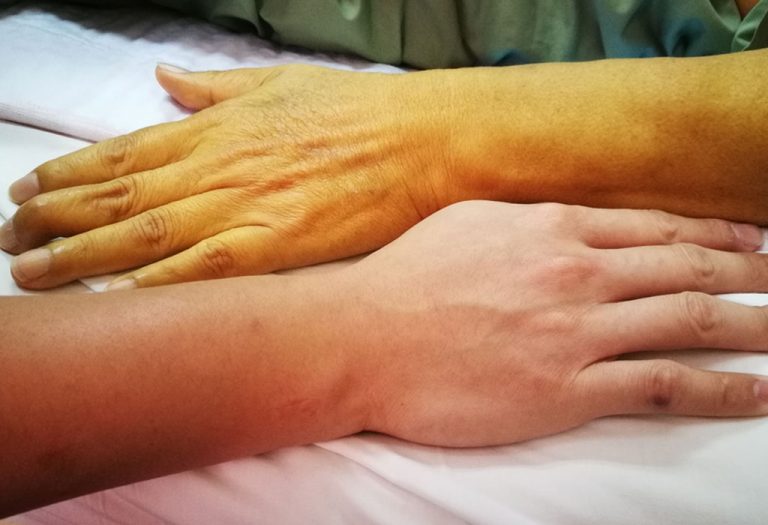Can You Have Periods While You Are Pregnant?

Most women suspect that they are pregnant when they miss their periods. When a woman is pregnant, she can’t have periods; that’s a fact. However, there is a common misconception that people tend to believe; it is that some women may get their periods while pregnant. While this isn’t possible, it might be important to note that they may mistake their other period-like symptoms during pregnancy for regular menstruation. This may even be further fuelled by the occurrence of bleeding and spotting that can be common during pregnancy and may be caused due to various reasons. Getting periods while pregnant may sound alarming; thus, keeping yourself informed and aware of the facts and myths is the wisest thing to do.
Can You Have Periods While You Are Pregnant?
The simple answer is ‘no’. It is not possible for a woman to menstruate during pregnancy (1). If you’re pregnant, it means that your eggs are fertilised and your uterus is preparing for a baby. Periods happen only in the event when the eggs remain unfertilized and the uterus does not need to prepare for a baby.
However, it is to be noted that an individual can experience bleeding during pregnancy, but not due to a period.
Why Can’t You Get a Period During Pregnancy?
Each month, the uterus develops a thick lining of tissue and blood, anticipating an egg to nestle in the uterus and develop into a baby. However, if a fertilised egg doesn’t reach the uterus, this lining of tissue and blood is shed, a process which is called menstruation. The hormone levels that rise when the egg is released from the ovaries tend to drop further, signalling that it is time for the lining to shed.
But when a fertilised egg implants itself in the uterus, the hormones in the body continue to rise and prompt your uterus to keep the lining inside the uterus intact to protect and nurture the embryo. Only once your pregnancy is through, in about nine months, will the lining shed.
Hence, it isn’t possible to get regular periods when you are pregnant (2).
Causes of Bleeding During Pregnancy
Although a person will not experience periods in pregnancy, they may experience bleeding due to various causes. While bleeding isn’t a definite cause for worry, it is important to learn about the potential causes.
First Trimester
You may expect bleeding during your first trimester in the form of mild spotting due to implantation bleeding as the fertilised egg attaches to the uterus. According to the ACOG, about 15 to 20% pregnant women experience spotting or bleeding in the first trimester of their pregnancy (3). March of Dimes lists out some more probable causes of bleeding in the first trimester (4):
- Infections, like chlamydia, gonorrhea, and other sexually transmitted infections (STIs) or urinary tract infections (UTIs), can be the cause of light bleeding.
- Ectopic pregnancy, which is a medical emergency.
- Miscarriage, which occurs before 20 weeks of pregnancy.
- hormonal changes
- Subchorionic haemorrhage, known as subchorionic hematoma, refers to bleeding that takes place between the placenta and the uterine wall.
- Gestational trophoblastic disease (GTD) is an uncommon condition that can mimic pregnancy by producing a tumour that may have abnormal fetal tissue.
- Molar pregnancy occurs when a fertilised egg that implants in the uterus develops into a noncancerous tumour instead of developing a placenta.
Pregnancy is never the same for everyone; it may come with unexpected symptoms. If you experience bleeding during your 1st trimester, reach out to your doctor without any delay to rule out any possible complications.
Second and Third Trimesters
Bleeding in the second and third trimesters is less common and may indicate a serious condition. If you experience vaginal bleeding in any of these stages that lasts longer than a few hours or is accompanied by cramps or belly pain, contact your doctor without any delay (5). Here are some conditions that may cause bleeding in the second and third trimesters (6):
- Placenta previa: This condition occurs when the placenta attaches low in the uterus, covering all or part of your cervix. It can cause bleeding.
- Cervical examination: A healthcare provider may evaluate the cervix to identify any irregularities or abnormalities. This process could lead to minor bleeding.
- Preterm labour or labour: Going into labour before 37 weeks of pregnancy is termed as preterm labour. This may cause some bleeding. Contractions, cramping, or your water breaking are other signs of preterm labour.
- Incompetent cervix: When the cervix opens (dilates) too early, it could cause bleeding.
- Placental abruption: This condition involves the placenta starting to detach from the uterus prior to the baby’s delivery. It is also a medical emergency.
- Sexual intercourse: While many individuals can continue engaging in sexual activity during pregnancy, unless advised otherwise by a healthcare provider, they might experience some spotting and bleeding due to heightened sensitivity of the vaginal and cervical tissues.
- Uterine rupture: This occurs when the uterus tears during labour, constituting a medical emergency. Although this condition is uncommon, the risk increases for those who have had a prior cesarean section or surgery on the uterus.
Bleeding at any point during pregnancy should not be ignored and should be discussed with the doctor as early as possible. Make sure to take note of the colour, quantity, and consistency of the bleeding and mention it to the doctor.
How Is Implantation Bleeding Mistaken for Periods?
On certain occasions, it is possible that the fertilised egg is implanted in the uterus, roughly about the same time during which you are expecting to have a period. As the egg burrows into the lining of the uterus, it is possible that there is some light spotting and white vaginal discharge which is primarily caused due to the thickening of the walls of the vagina.
Many women can mistake this implantation bleeding, which is characterised by light spotting, for regular periods with less than normal bleeding. This may be considered as periods during the first month of pregnancy, and you may, at times, not even realise that you are pregnant until you miss your next period.

How Is Sporadic Bleeding Mistaken for a Period?
There are many other causes that result in spotting or bleeding that can be mistaken for period-like bleeding during early pregnancy.
- Breakthrough bleeding: Your body releases hormones like progesterone at the beginning of the cycle. When you are pregnant, the level of these hormones increases, which stops your period. However, there are times when the hormone levels aren’t sufficient, and it causes breakthrough bleeding around the same time that you are meant to have a period.
- Ectopic pregnancy: When the fertilised egg is incorrectly implanted in the fallopian tube or in the neck of the uterus, it is called an ectopic pregnancy. One of the symptoms of ectopic pregnancy is heavy vaginal bleeding along with pain in the abdomen and pelvis. An ectopic pregnancy needs to be dissolved or surgically removed.
- Cervical changes: Throughout the course of the pregnancy, the cervix, which is the opening of the uterus, is closed. However, when it experiences irritation or intrusion during events like a pelvic exam, intercourse, etc., it may result in light bleeding.
- Miscarriage: Miscarriage takes place when there is a developmental issue with the baby. It is characterised by heavy bleeding and cramps.
- Bleeding after birth control: Birth control pills cause hormonal changes in the body. In case you get pregnant after stopping the birth control pills, then you may see spotting or light bleeding.
- Bleeding caused by placental conditions: There are certain situations involving the placenta that may cause vaginal bleeding especially in the second and the third trimesters. Placenta praevia is a condition where the placenta is blocking the cervix partially or fully. This condition may cause light or heavy bleeding. Another condition is placental abruption, where the placenta is separated from the uterine wall. In the case of placental abruption, you may experience severe abdominal pain along with slight or heavy bleeding.
- Other causes: There are also other causes, like infection or molar pregnancy, where an abnormal mass gets fertilised in place of the fetus, which can cause bleeding during pregnancy.
While it is not possible to be pregnant and have your period at the same time, there can be certain situations that may make you believe that you are on your period. Also, symptoms like cramps, backache, or irritability are common during both pregnancy and menstruation.
Minor bleeding and spotting are common during pregnancy and hardly cause any harm to you or the baby. However, if you are pregnant and are bleeding too much, it may indicate an underlying problem with the pregnancy, and you will need to contact your medical practitioner immediately and seek medical help.
When to Consult a Doctor?
Your doctor should be notified of any spotting or bleeding you experience at any moment in your pregnancy.
Call your provider right away if you experience any of the following, more serious symptoms (6):
- Heavy bleeding. This means you’re filling a pad every few hours.
- Pelvic pain or pain in your abdomen
- Cramping or contractions
- Dizziness or fainting
- Fever or chills
- Other signs of preterm labour include your water breaking. If your provider’s office is closed, you should go to the nearest emergency room (ER).
FAQs
1. How much bleeding in early pregnancy is considered normal?
Although bleeding in early pregnancy is commonly seen, it does not mean anything is wrong. If you are unsure whether is bleeding or spotting, consult your doctor without any delay. While some are harmless reasons for bleeding, not all are.
2. Is period-like bleeding during pregnancy normal?
Period-like bleeding during pregnancy isn’t typical. Bleeding during pregnancy is not always a sign of worry, but heavy or continuous bleeding means there’s a complication.
3. Does bleeding in early pregnancy lead to miscarriage?
Yes, there are several causes of bleeding in early pregnancy that do not cause miscarriage.
4. When can I expect spotting to stop in pregnancy?
Although spotting during pregnancy is most commonly seen and stops in the first trimester, it can also occur in the second and third trimesters.
5. Can I experience heavy bleeding and still be pregnant?
Technically, you can’t have a full period while pregnant. It is possible to experience heavy bleeding and still be pregnant. However, this can be concerning. Various factors may cause bleeding in early pregnancy, such as implantation bleeding, subchorionic hematoma, infections, or more serious issues. It’s important to consult a healthcare provider if you observe this change.
Most women who experience minor bleeding during pregnancy usually deliver without any complications. However, if you notice spotting and bleeding, it is advised that you reach out to a doctor and have it checked to rule out any instances of a problem during pregnancy.
References/Resources:
1. Nemours TeensHealth – Can You Still Have Your Period if You’re Pregnant?
2. Cleveland Clinic – Conception
3. ACOG – Bleeding During Pregnancy
4. March of Dimes – Bleeding and spotting from the vagina during pregnancy
5. Mayo Clinic – Bleeding during pregnancy
6. Cleveland Clinic – Bleeding During Pregnancy
Also Read:
Rectal Bleeding During Pregnancy
Can you Get Pregnant without Period?
Pregnancy Symptoms Before Missed Period
Was This Article Helpful?
Parenting is a huge responsibility, for you as a caregiver, but also for us as a parenting content platform. We understand that and take our responsibility of creating credible content seriously. FirstCry Parenting articles are written and published only after extensive research using factually sound references to deliver quality content that is accurate, validated by experts, and completely reliable. To understand how we go about creating content that is credible, read our editorial policy here.



































